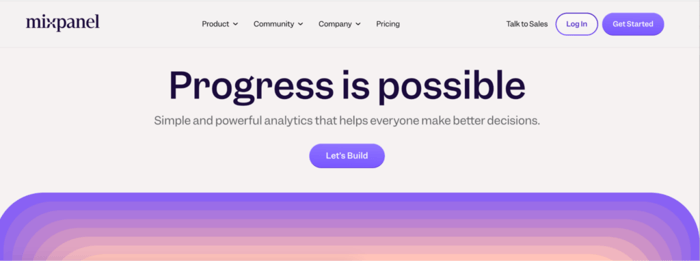The Top 5 Marketing Tools in Every Category
Looking for the best marketing tools?
Scott Brinkler from Chief MarTech estimates there are over 11,000 marketing tools in 2023, and the list will likely keep growing if the past ten years’ growth is anything to go by.
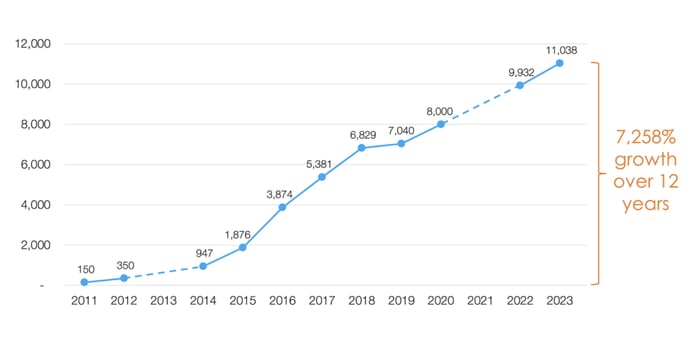
With so many tools, getting lost in hundreds of lists is easy. That’s why we decided to create the ultimate list!
The list of marketing tools below is by no means exhaustive. It’s merely a “small” selection of the best marketing tools with outstanding features to help marketing teams create the right toolkit for their business.
Plus, it’s sorted into different categories, so you can hop to a particular section or peruse the whole list at your leisure.
Enjoy!
TABLE OF CONTENTS
- Best social media marketing tools
- Best marketing analytics tools
- Best content marketing tools
- Best email marketing tools
- Best search engine optimization (SEO) tools
- Best search engine marketing (SEM) tools
- Best marketing automation tools
- Best account-based marketing tools
- Best conversion rate optimization (CRO) tools
- Best public relations (PR) tools
- Best SMS marketing tools
- Best local marketing tools
Best Social Media Marketing Tools
What are social media marketing tools?
Individuals and teams of all sizes use social media tools to increase brand awareness, manage workflows, and engage online communities through their social media profiles. These tools can help you in several ways:
- Manage Multiple Accounts: All your social media accounts are combined into a single dashboard. This enables you to stay organized even when you’re managing multiple accounts.
- Plan Content: Social media tools allow you to schedule posts in advance. They can suggest optimal posting times and give you insight into audience preferences.
- Publish Posts: They allow you to upload content and then directly post it to your social profiles. You can distribute your messages with a few clicks without logging into each platform.
- Schedule Posts: You can pre-set a posting schedule and automate your posts to all your platforms at specific dates and times.
- Interact with Communities: You can easily interact with your audience and quickly respond to comments, mentions, and messages through a single social inbox.
- Store and Archive: You can store and organize all your assets in a central library so they’re easy to access whenever needed.
The benefits of social media marketing
- It increases brand awareness. A social media marketing campaign can get your brand in front of your audience more quickly and efficiently than any other marketing channel.
- There are lower marketing costs compared to traditional marketing methods.
- Social media allows you to engage directly with your customers in real time.
- You can create highly targeted campaigns based on demographics, interests, behaviors, etc. This gives you more precision in your marketing, making social media a highly efficient tool for reaching a specific audience.
- Social media is one of the most popular places for consumers to find new products. 27% of consumers find new products through ads seen on social media, and 22% find new products through recommendations and comments on social media.
- These advantages ultimately lead to increased traffic and sales.
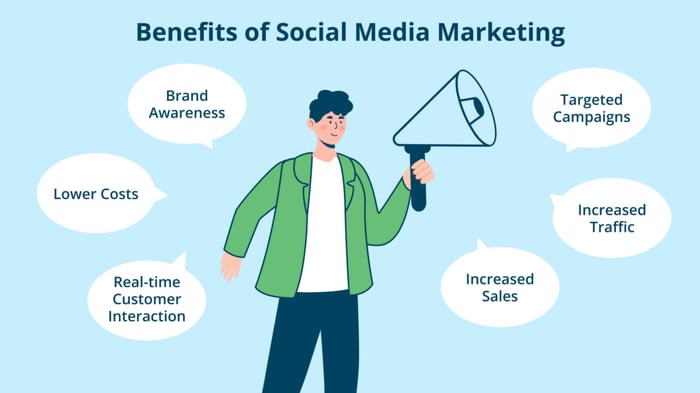
Social media marketing tools for scheduling
The benefits of automatic scheduling
- Automated scheduling of social media posts gives you several benefits. By scheduling posts in advance, you can maintain a steady flow of content and avoid last minute posts.
- It helps you reach audiences across different time zones without manual input.
- Also, scheduling means you can time your posts at optimal times so that they’re shared when your target audience is most active. This leads to increased awareness and engagement with your posts.
- It means you’re less likely to make mistakes, and if you do, you have time to put them right before they reach your audience.
- Automation frees up time so you can focus on creating new, relevant content, refining your strategy, and keeping in touch with your community.
What to look for in scheduling tools
Any social media marketing tool should integrate with many social media platforms. For instance, Loomly integrates seamlessly and lets you schedule automatically with Facebook, Twitter, Instagram, Pinterest, LinkedIn, YouTube, Google Business Profile & TikTok.
Visual previews: A post planner with a choice of views, such as list view, calendar view, and post overview lets you see at a glance what you’ve scheduled.
Bulk scheduling: This feature makes it easy to share content between social channels. You can save time by creating a post and then easily fine-tuning it for each of your social accounts.
Analytics: The ability to measure your posts’ performance means you can see at a glance which posts do best. You can then use this information to adapt your social media strategy.

Social media marketing tools for analytics
Most business leaders today recognize the importance of analytics in any marketing channel. A whopping 84% of business leaders say that customer data and analytics are high on their list of priorities.
The continuing growth in social media users and an appreciation of the value of analytics tools means that the social media analytics market is expanding rapidly. In 2022, it was worth $6.36 billion, and it’s projected to grow by 27.1% annually from 2023 to 2030.
There’s a reason these tools are so highly regarded. Analytics provide crucial information that allows you to continually make improvements to your social media campaigns. In today’s competitive market, they provide advantages you can’t afford to miss.
The benefits of using analytics tools
- Learn about your audience’s preferences and habits
- See precisely how well your campaigns are doing
- See how you stack up against your competitors
- Measure engagement levels
- Discover the best times and content types for engagement
- Get social media reports with clear, visual data breakdowns
- Tweak your approach based on your insights
Key metrics to track with social media analytics tools
- Engagement rates (likes, shares, and comments compared to impressions)
- Click-through rates
- Follower growth and retention
- Who’s talking about you, and what they’re saying
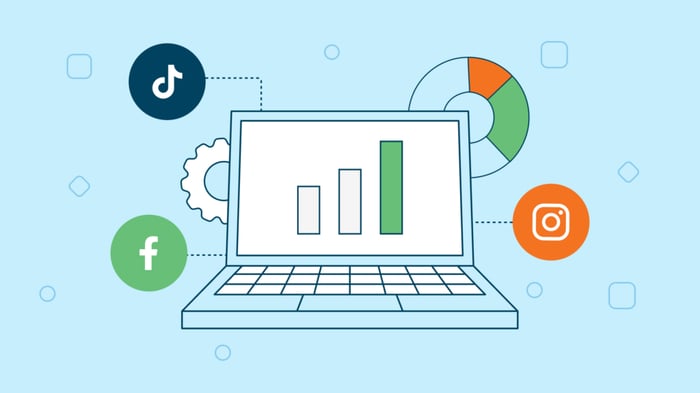
Social media marketing tools for monitoring and listening
Similar to analytics, social media monitoring, and listening, keep an eye on what people are saying about your brand, your competitors, and topics relevant to your industry. They help you understand your audience’s thoughts and feelings, spot new trends, and react quickly to these insights.
However, social media monitoring and listening differ from analytics. They’re less structured than social media analytics and don’t necessarily use hard data. Monitoring entails keeping your ear to the ground and catching real-time chatter. Analytics dives deeper, looking at the numbers and patterns behind the chatter.
Along with analytics, social media monitoring and listening are important business strategies. In fact, 80% of brands understand the value of social listening and use it as a key strategic element.
The benefits of using social media monitoring tools and social media listening tools
- Get instant alerts and insights
- Keep an eye on what people are saying about your brand
- Check out trends and leading voices in your industry
- Spot any potential PR storms brewing
- Act quickly based on your insights
- Track your competitors’ activities and performance
- Fine-tune your strategy using the knowledge you’ve gained
Key features to look for in monitoring tools
- Keyword and hashtag tracking
- Real-time alerts
- Ability to track how people feel about your brand
- Visual dashboards for easy interpretation
- Integration with all your favorite social media platforms

The use of AI and social media marketing tools for automation
There’s an increasing need for social media automation tools as campaigns become bigger and more complex and audiences grow. Artificial intelligence is increasingly important in automating social media marketing and other business processes. Business leaders are well aware of AI’s advantages to the corporate world, and 57% of leaders plan to increase their AI budget by 25% or more next year.
Automation tools are designed to reduce manual tasks by automating repetitive or routine tasks. They can be used to optimize your scheduling to social platforms, data collection and reporting, basic customer service, managing interactions with followers, monitoring and listening, and social ads management. In addition, AI can produce written content, captions, images, and video.
The benefits of using automation tools
- They streamline repetitive tasks and save time
- Reduce the response time of your customer service
- Keep you consistent in posting and engagement across your social media network
- Help you run advanced strategies like drip campaigns
- Assists in avoiding human error
Key features to consider in automation tools
Automation tools can offer a wide range of features. Here are just a few you might want to consider:
- Easily post across all your social media accounts
- Advanced scheduling options
- Automated replies to comments or direct messages
- Analytics and reporting
- Social listening
- Hashtag tracking
- Ad campaign management
- Integrates well with your other marketing tools (CRM, email marketing)
Don’t be tempted to overdo the use of automation, though. You need to keep a balance between automation and authenticity. Followers and customers want to talk to real humans, and ill-timed content could be a huge public relations misstep. So keep checking in to ensure you’re giving the right impression, and adjust your approach when necessary.

Social media marketing tools for customer support
There’s no doubt that good customer support significantly impacts your brand image. 60% of business leaders say it improves customer retention. Moreover, social media’s convenience and low cost means it plays an increasingly key role in customer service.
The benefits of using social media for customer service
- Chat with customers quickly and conveniently
- Your customers can contact you through multiple channels
- You can easily reach customers all over the world
- It’s cheaper than many other forms of customer support
- It increases your brand visibility
- Boost your brand’s reputation by sorting issues out in the open
- Enhance customer loyalty with quick, proactive support
Key features to look for in social media customer service tools
- Automated responses for common questions
- The ability to track mentions, comments, and messages in real time
- Integration with your CRM and other support tools
- Tracking and prioritization of incoming queries
- Monitoring customer satisfaction levels
- Workflow automation (or integration with automation tools like Zapier)
- Analytics to track response times and customer satisfaction
When using social media customer service tools, make sure you find the correct balance between automation and human interaction. Be sure your system can scale up to respond quickly during peak times with many queries.
Social media marketing platforms come in all shapes and sizes, offering a wide range of features and capabilities to help you optimize your social media activities.
Here’s our Top 5:
Loomly
Loomly is an all-in-one social media management tool that helps your marketing team optimize your social strategy. You can use it to manage every aspect of your social media processes, workflows, and communication on social media. Loomly offers advanced features that allow you to:
- Manage your brand assets in Library.
- View your content calendar at a glance.
- Schedule content with automated publishing
- Fuel your storytelling with Post Ideas.
- Polish your social content with Post Optimization Tips.
- Collaborate effectively with Post Mockups and Approval Workflows
- Target posts to a specific audience
- Reach your audience with scheduled sponsored posts
- Streamline community management and optimize engagement through a single inbox
- Measure your social media metrics with Advanced Analytics
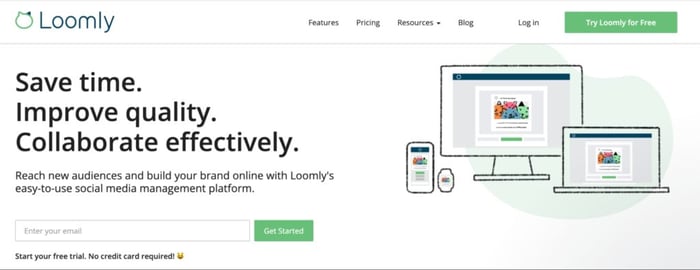
No credit card required, unlimited premium features, unlimited collaborators: start your 15-day free trial now.
Buffer
Buffer is a social media management platform trusted by individuals, brands, and agencies to help social media marketers work more effectively and improve their social strategy. It includes tools for publishing, engagement, analytics, and team collaboration.
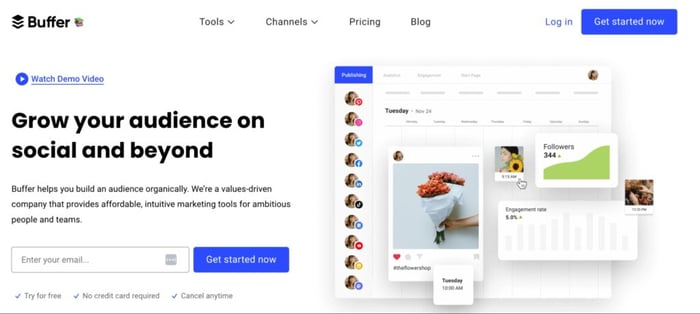
Hootsuite
Hootsuite is a social media manager tool used by millions of individuals, social media teams, and organizations worldwide to enhance their social media presence. It includes social media monitoring, listening, publishing, detailed analytics, and reporting tools.
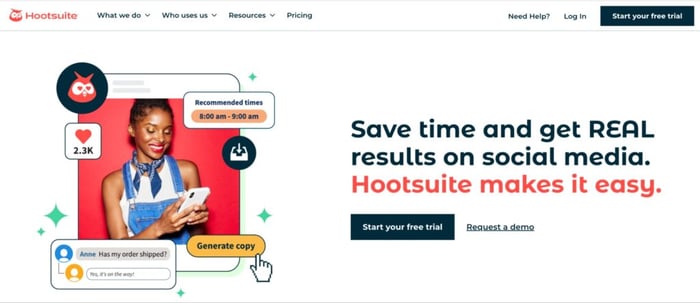
Mention
Mention is a social listening tool and media monitoring platform that lets you easily track social posts about your brand or product and get comprehensive industry analytics. It helps you track your social media performance and measure the impact of your marketing and PR activities.
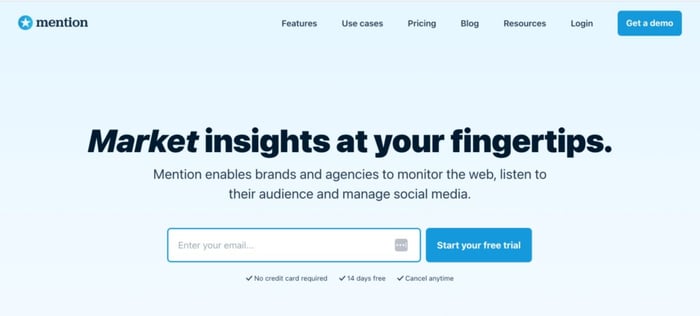
Sprout Social
Sprout Social is an all-in-one social media management platform that allows marketers to improve audience engagement through all their social channels. It enables streamlined publishing workflows, collaboration in real-time, bulk uploading, and gathering actionable insights about the performance of your social media content.
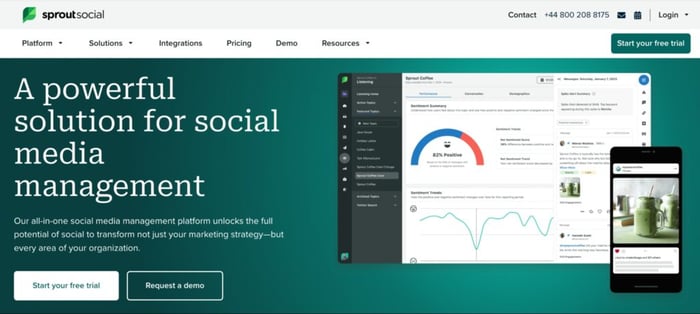
Best Marketing Analytics Tools
Marketing analytics tools enable an organization to manage, evaluate, and control its marketing efforts by measuring performance. These tools can help businesses improve their return on investment (ROI) by identifying their effective marketing campaigns.
These tools typically allow you to:
- Collect data on marketing campaigns from various channels.
- Monitor marketing campaigns and targeted audiences.
- Analyze the results and compile marketing campaign insights.
- Visualize marketing campaign performance via a dashboard.
- Collect data about your customer’s habits and preferences to create accurate buyer personas.
Here’s our Top 5:
Clicky
Clicky is a real-time analytics tool that makes it easy to monitor, analyze, and react to your website’s traffic and discover how people are using your site.
It filters out referrer spam and bots so that you get accurate data on every individual visitor, page view, and event. Plus, you can also view heat maps by page, visitor, or segment.
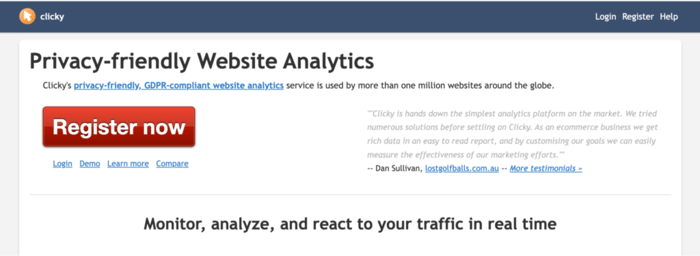
Databox
Databox helps you track the performance of all your data in one place. You can track progress towards your goals, visualize performance trends, make more informed decisions, collaborate, and report as you go using custom views and detailed analytics for each function in your organization.
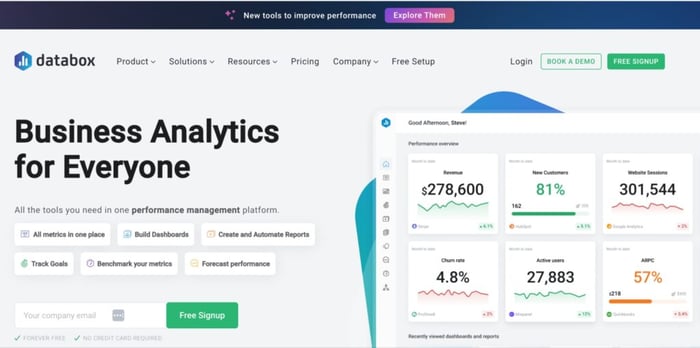
Google Analytics
Google Analytics is a free tool that provides the latest insights into how visitors arrived on your site, the amount of time they spent there, how they came to know your site, how they use your site, and how you can keep them coming back. Plus, you can measure sales and conversions and track UTM parameters.
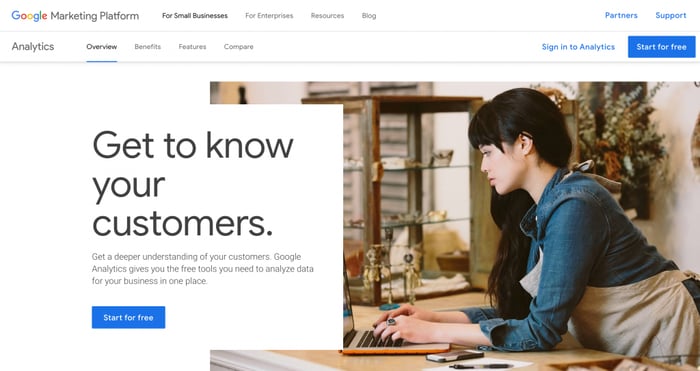
MixPanel
Mixpanel is an excellent product analytics tool that helps companies measure the data that matters, make decisions fast, and build better products. Its powerful, self-serve product analytics allows you to engage, convert, and retain more users.
Supermetrics
Supermetrics is the #1 reporting automation tool for PPC, SEO, social, and web analytics. It helps digital marketers pull all their analytics data into one place, including spreadsheets like Google Sheets, Data Studio, Excel, and BigQuery, and data visualization platforms such as Tableau, Qlik, and Power BI for reporting and analysis.
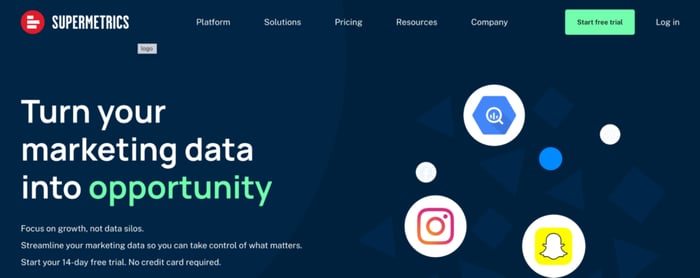
Best Content Marketing Tools
There are hundreds of content marketing tools that serve tons of different purposes, from content ideation to production, optimization, and promotion.
Here’s our Top 5:
AnswerThePublic
AnswerThePublic is a simple content search tool that allows marketers to get instant, raw search insights directly from their customers’ minds. The software uses Google autocomplete data to generate every useful phrase and question people ask around your keyword.

BuzzSumo
BuzzSumo provides insight into what content is working for any topic or competitor by analyzing hundreds of millions of pieces of content. You can see metrics like social shares, backlinks, and which influencers share any given piece of content.

Google Docs
Google Docs lets you create and edit text documents in your browser. Multiple people can work on a document simultaneously, with every change saved automatically, which makes it perfect for content marketing collaboration. Add-ons allow you to upload Google Docs directly to your CMS, such as HubSpot and WordPress.
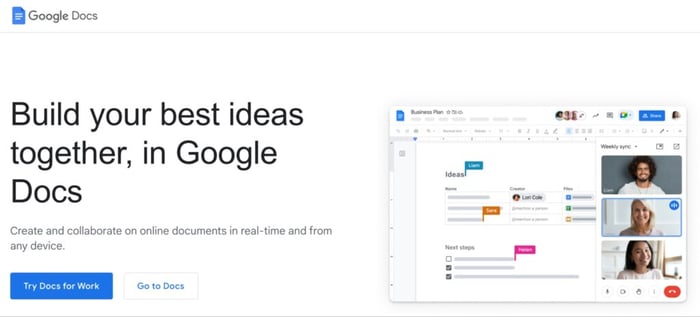
Grammarly
Grammarly offers you detailed, real-time suggestions for improving word choice and tone, making sentences clearer, and fixing grammatical errors. Whether your team is writing emails, articles, or social media posts, Grammarly helps them produce work that reflects your brand.
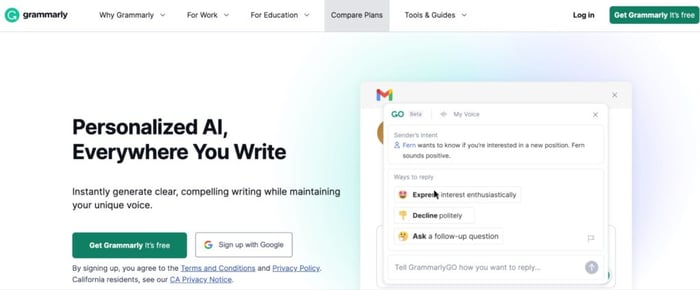
WordPress
WordPress is the most popular content management system (CMS) that allows you to host and build websites. It uses themes and plugins to customize the design and layout to fit your brand’s content. You can either self-host with WordPress.org or host your site via WordPress.com.
Best Email Marketing Tools
Email marketing tools help marketers send commercial messages to groups of people via email. Typically, they let you:
- Design and build customized emails via HTML/CSS or WYSIWYG editors.
- Preview and send test emails.
- Scheduling features to set specific times for your emails
- Store, track, segment, and manage email contact lists (subscribers).
- Provide campaign-based reporting and analytics.
Here’s our Top 5:
AWeber
AWeber is a market leader of small business email marketing software. It helps you quickly build responsive landing pages, load and manage contacts, send amazing emails, deliver push notifications instantly, and analyze results – all without having to be a tech whiz.
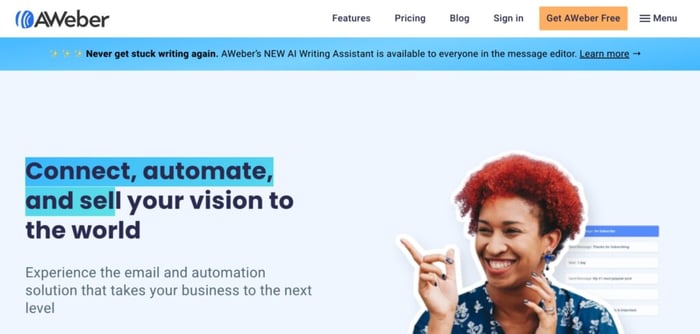
Constant Contact
Constant Contact provides small businesses and nonprofits powerful tools with all the tools they need to market ideas, build a professional brand online, attract customers, and sell more products. Its email software lets you create professional emails, turn ecommerce leads into contacts and loyal customers.
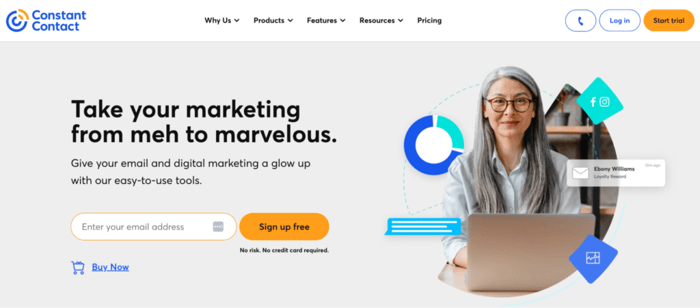
iContact
iContact helps brands of all stages and sizes get results with their email marketing. Its easy-to-use tools help you design beautiful emails, personalize your messages, automate your communications, and grow your audience.
![]()
Mailchimp
Mailchimp is an all-in-one marketing platform that helps small businesses grow faster. Besides sending marketing emails and automated messages, you can create targeted ad campaigns, build landing pages, send postcards, manage reporting and analytics, and sell online.

Brevo
Brevo is an all-in-one marketing platform to help you engage with your contacts and build stronger customer relationships by sending targeted and relevant messages.
In addition to email marketing, you can send transactional messages via email and SMS. There are also tools for marketing automation, SMS marketing, Chat, Facebook Ads, and a CRM to keep all your customer details in one place.
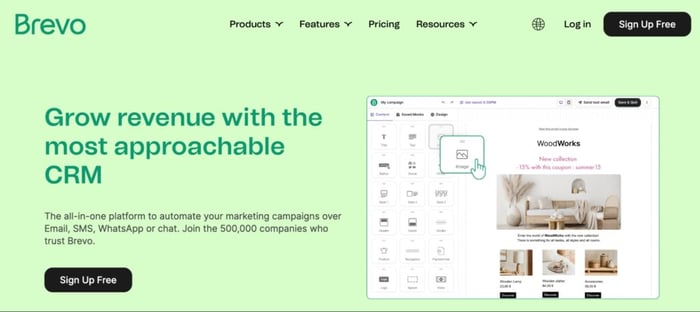
Best Search Engine Optimization (SEO) Tools
Search engine optimization (SEO) tools are designed to improve the ranking of content in search engine results pages (SERPs) organically. The software typically lets you perform one or more of the following:
- Research competitors to unearth their organic keywords and backlink strategies.
- Research keywords and see how difficult it would be to rank.
- Research content to discover the most popular content on any topic and find the best ideas.
- Optimize content using AI, semantic SEO, and automated SEO.
- Track your search rankings along with your competitors’.
- Find the strongest backlink opportunities in your niche.
- Audit websites to discover what SEO issues they have and learn how to fix them.
- Generate performance reports on optimization-related metrics.
Here’s our Top 5:
Ahrefs
Ahrefs’ all-in-one SEO toolset can help you with competitor research, link building, keyword research, content research, rank tracking, and website audits.
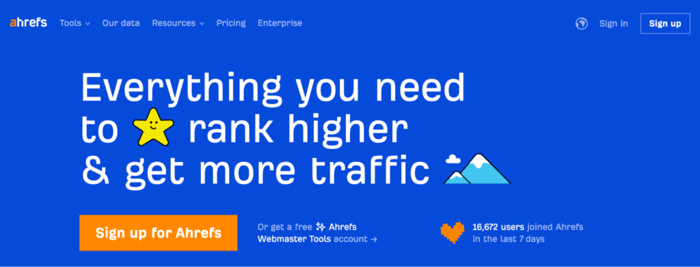
Google Search Console
Google Search Console gives you insight into your site’s search traffic and performance, allows you to identify and resolve any issues, and makes sure it ranks in Google.
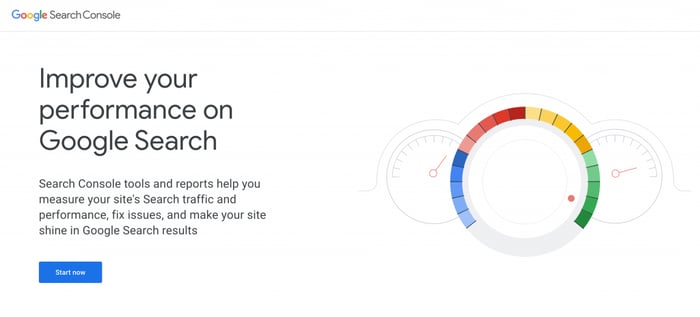
Moz Pro
Moz Pro is an all-in-one suite of SEO tools that lets you crawl and audit your site(s), discover link building opportunities, optimize content, analyze competitors, research keywords, and create custom reports.
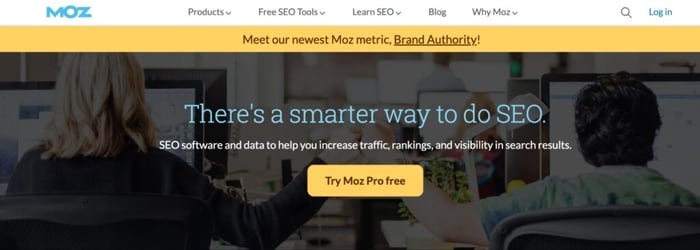
Screaming Frog SEO Spider
Screaming Frog SEO Spider is a website crawler tool that helps you improve onsite SEO by extracting, analyzing, and auditing data for common SEO issues, such as broken links and duplicate meta descriptions, page titles, and content.
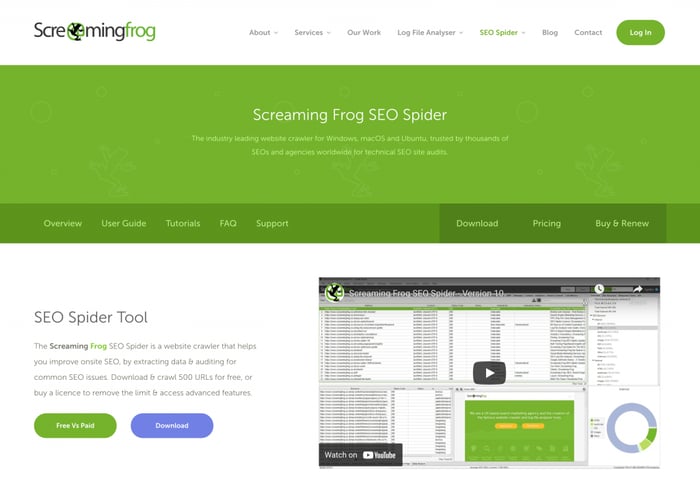
SE Ranking
SE Ranking is an all-in-one SEO toolset that’s perfect for small business owners and agencies. It includes tools for keyword research, competitor analysis, keyword suggestion and grouping, keyword position tracking, backlink monitoring, website auditing, and professional reporting.
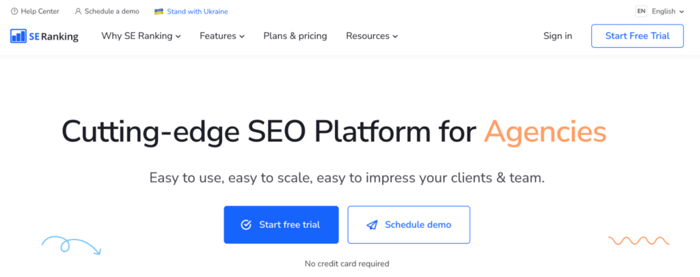
Best Search Engine Marketing (SEM) Tools
Search engine marketing (SEM) tools help you manage and optimize paid search campaigns activities, such as targeting valuable keywords, optimizing ad copy, images, and landing pages, plus tracking key metrics.
Here’s our Top 5:
Google Ads Editor
Google Ads Editor is a free, downloadable app that lets you create, edit, and preview multiple ads offline in draft mode before they go live. You can also track important campaign metrics, like click-through rate, cost, position, and conversion metrics.
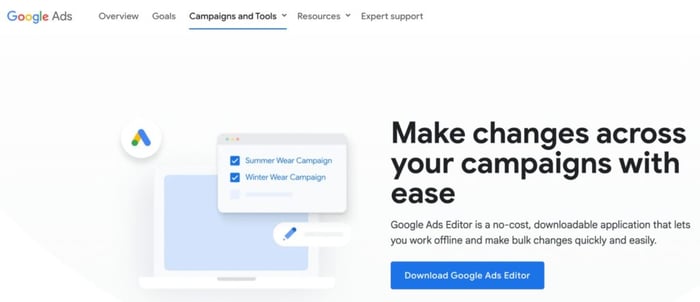
Google Keyword Planner
The Google Keyword Planner is a useful SEM tool for generating keyword ideas and getting volume and CPC estimates right down to the country, state, and city levels. Once you’ve identified the keywords you want, you can add them to your Google advertising plan.
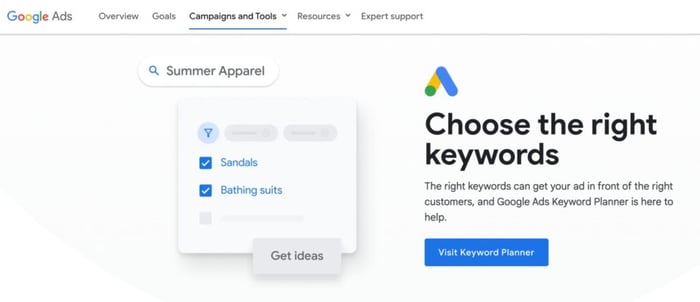
Optmyzr
Optmyzr is one of the best SEM tools available, especially for agencies managing various clients. You can launch, track, and manage multiple PPC campaigns on the Google and Bing search platforms.
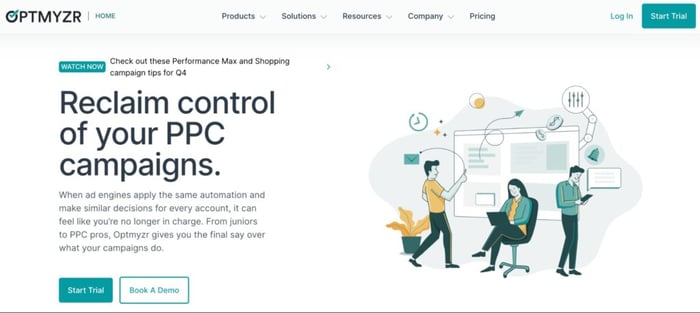
Semrush
Semrush is an all-in-one marketing platform for businesses. Its Advertising Toolkit has all the research, analysis, and planning functionality you need to build profitable SEM campaigns. You can find the best keywords for every PPC campaign and monitor your competitors’ ad copy and landing pages.
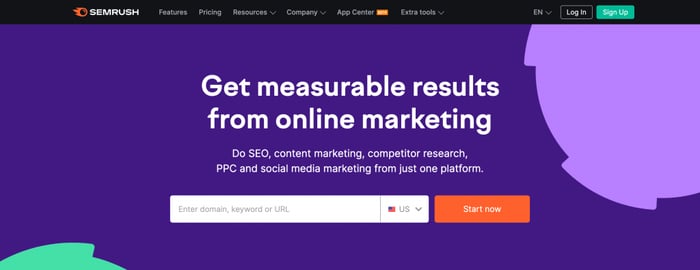
SpyFu
SpyFu is a PPC competitive intelligence tool that lets you see which keywords your competitors are buying on Google Ads and check out which ad variations they’ve tested. Plus, you can monitor your PPC rankings on Google and Bing.
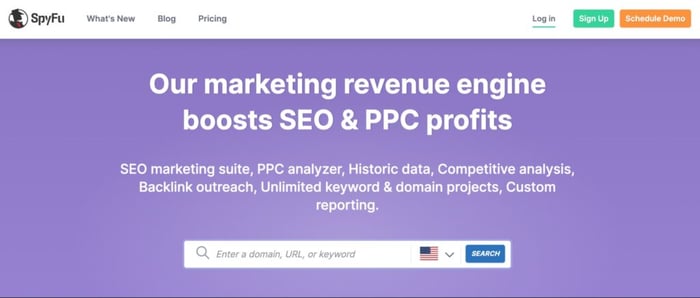
Best Marketing Automation Tools
Marketing automation tools automate marketing actions or tasks, streamline marketing workflows, and measure marketing campaign outcomes. These platforms provide automation features across multiple marketing channels, including email, social media, SMS, and digital ads.
Marketing automation tools usually come with advanced email marketing features, such as A/B testing, spam filter testing, scheduling, and segmentation, plus extensive analytics features to measure the success of a campaign across segments and channels.
Here’s our Top 5:
ActiveCampaign
ActiveCampaign includes hundreds of pre-built automations combining personalized email marketing, powerful marketing automation, and a smart CRM. There are also 300+ integrations, including Shopify, Square, Facebook, and Salesforce. Brands of all sizes use its comprehensive segmentation and personalization across social, email, messaging, chat, and text.
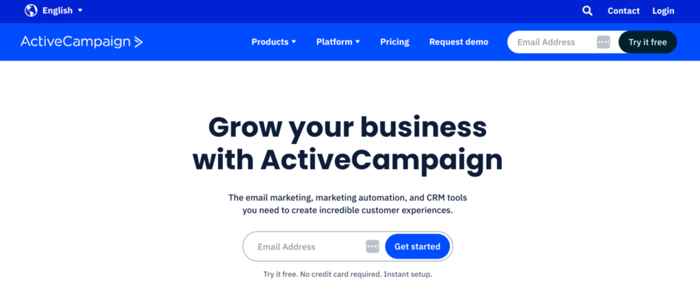
Drip
Drip’s comprehensive tracking, hyper-segmentation, and robust email marketing automation allows marketers to build stronger and more profitable relationships with their customers and scale as their business grows.
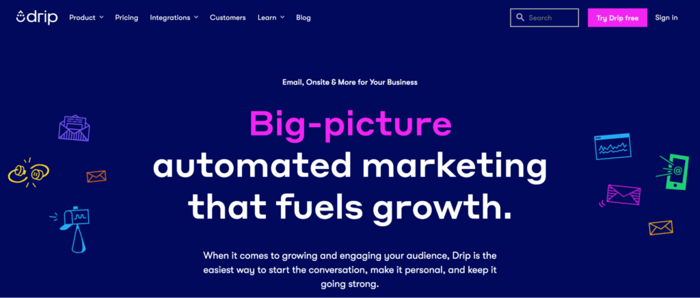
Intercom
Intercom is a Conversational Relationship Platform (CRP) consisting of a business messenger, a suite of management tools, a customer database, and further integrations with over 250 apps.
In short, the platform has everything you need to build better customer relationships through personalized, messenger-based experiences across the customer journey – without overwhelming your team.
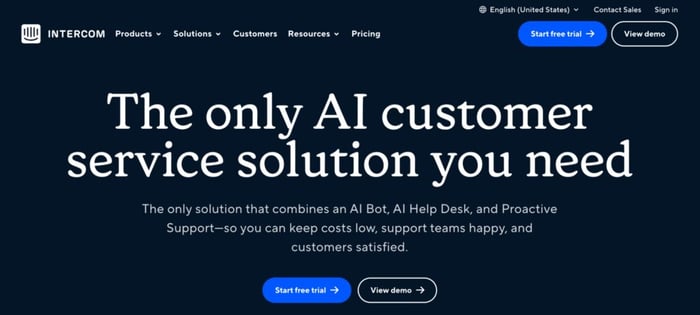
Marketo
Marketo Engage is transforming marketing automation by bringing together customer data, content, automation, and analytics. Marketing and sales teams can use the platform to coordinate interactions with customers that are both personalized and measurable – and do it with efficiency and scale.
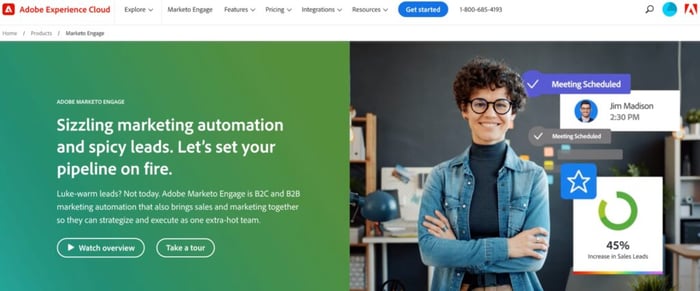
Omnisend
Omnisend’s email and SMS marketing platform helps e-commerce brands increase sales and meet their business goals on autopilot. It can help increase conversion rates with custom-made, highly relevant emails and texts.
Its full integration with ecommerce platforms, pre-built automation workflows, and intuitive, no-code editing make it a dream to use.
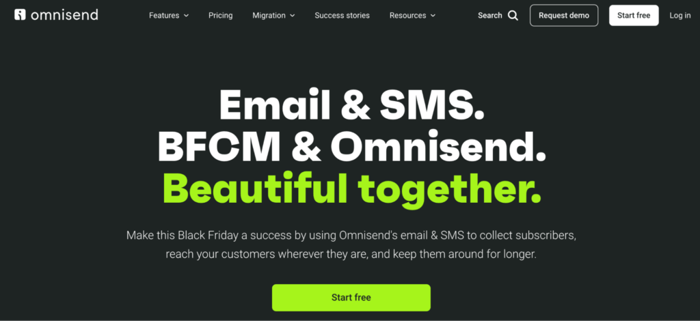
Best Account-Based Marketing (ABM) Tools
Account-based marketing (ABM) is a marketing strategy that targets companies rather than individual customers. ABM software automates and reduces the time-consuming process of identifying prospects and devoting the appropriate resources to nurture the most promising accounts.
Here’s our Top 5:
Demandbase
Demandbase’s ABM platform for businesses includes a full suite of tools that help B2B marketers find, engage, and convert accounts into customers. It connects all customer data in one user dashboard for a unified approach to account-based sales and marketing across multiple channels.
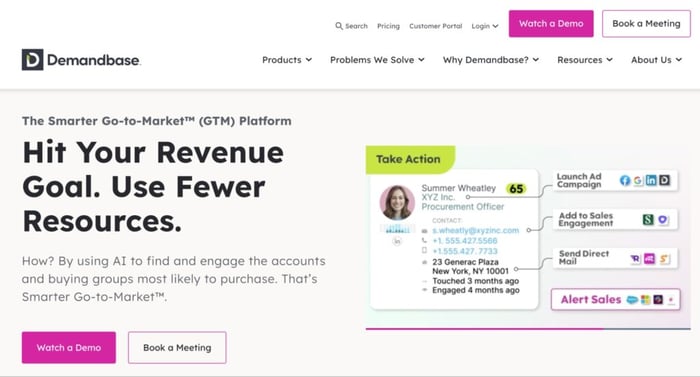
LeanData
LeanData provides a set of products powered by Salesforce for marketing, sales, and revenue management with lead-to-account matching at its core. With LeanData, sales reps receive only the leads they need, so they can close more deals and drive more revenue faster than before.
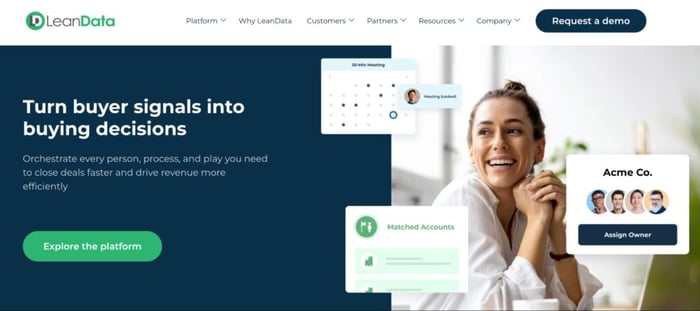
Terminus
Terminus is a full-service ABM platform that helps marketers target the right accounts with dynamic data, engage them with unified multi-channel campaigns, and access the performance metrics of those campaigns. Understanding these reports enables you to target accounts more effectively.
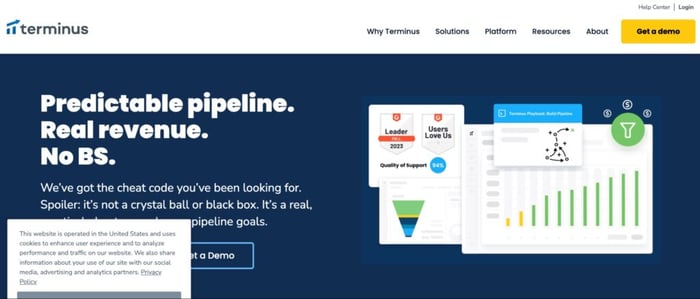
Triblio
Triblio’s ABM platform specializes in the growth of account pipelines and combines account-based advertising, web personalization, and sales activation tools to optimize campaigns across multiple channels. These campaign tools and analytics run on a proprietary AI-powered purchase intent engine that scores the level of interest each account has in making a purchase.
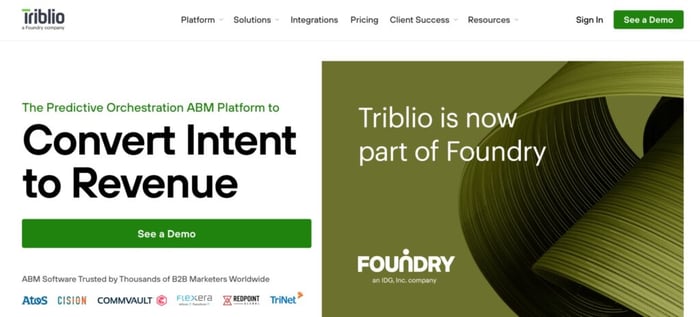
6sense
The 6sense Account Engagement Platform helps B2B organizations achieve predictable revenue growth via the power of AI, big data, and machine learning. It equips revenue teams with everything they need to know about their buyers so that they can generate more opportunities, get into those opportunities sooner, increase the deal size, and compete and win more often.
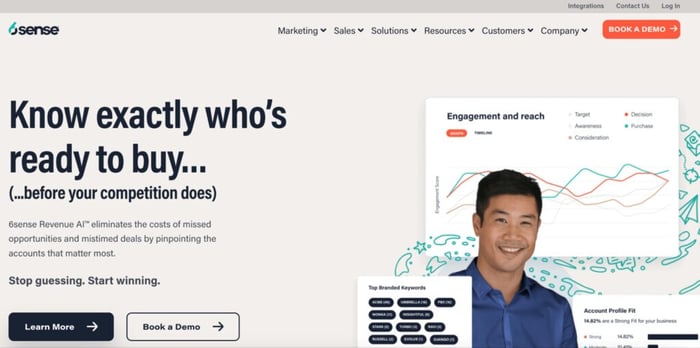
Best Conversion Rate Optimization (CRO) Tools
Conversion rate optimization (CRO) software provides testing and visualization tools to help you improve user experience and increase conversion rates. CRO tools, such as A/B testing software, Heat maps, and Landing page builders, work alongside other digital analytics software to track visitor behavior.
Here’s our Top 5:
Crazy Egg
Crazy Egg gives you access to five different types of heatmaps, a visitor recordings/session replay tool, A/B testing, and user surveys. It’s a complete CRO package to understand what your web visitors are doing and transform your business by improving the user experience.
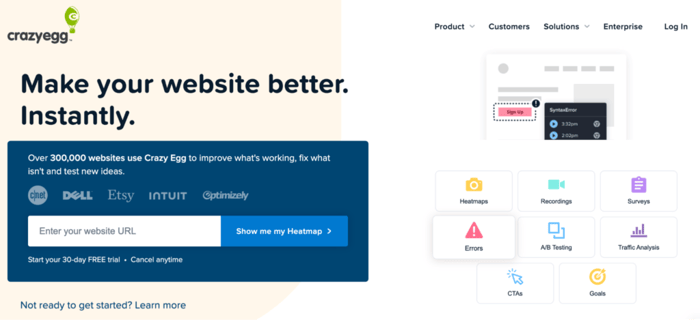
Hotjar
Hotjar’s behavioral analytics software helps you understand how users are using your site, collect user feedback, and convert more site visitors into clients. When you understand user behavior better, you can make the right changes, improve the user experience (UX) and improve conversions.
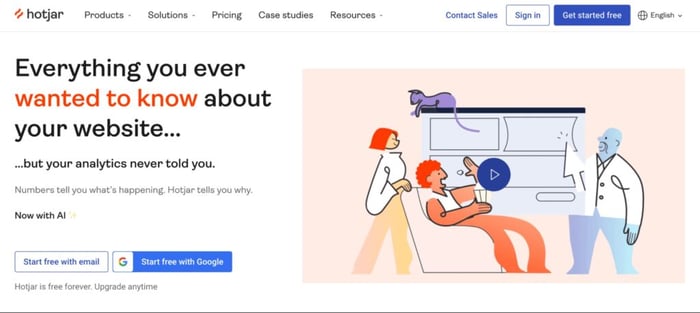
Optimizely
Optimizely is a leading experience optimization platform. Its AI-powered personalization and experimentation platform provides A/B testing, multivariate testing, and server-side testing tools, plus website personalization and feature toggle capabilities.
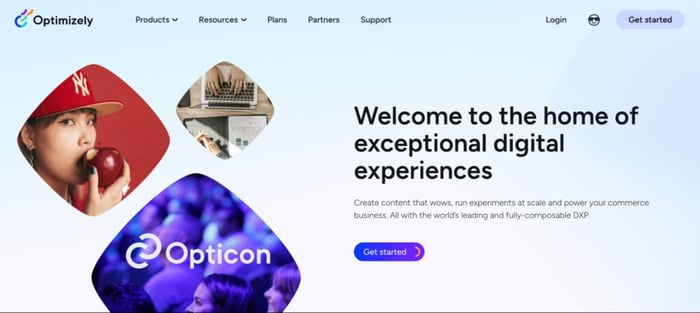
Hello Bar
The Hello Bar plugin adds customizable popups to your website. You can target messages to users based on factors such as their device and location. It features multiple analytics tools that allow you to run A/B tests, track and analyze performance, and create custom reports. The installation process is simple, and there are built-in integrations with many different platforms.
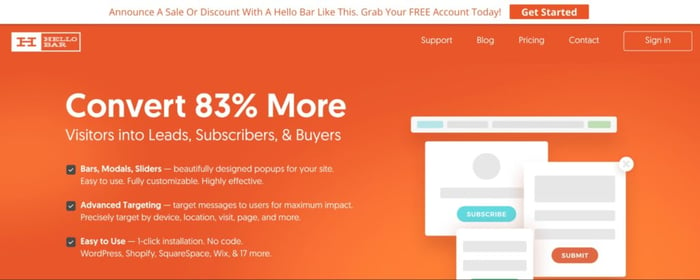
Unbounce
Unbounce helps you convert more of your visitors into leads, sales, and customers. The drag-and-drop builder lets you create and publish your own landing pages without needing a developer. And the conversion intelligence insights ensure you have the best campaign performance every time.
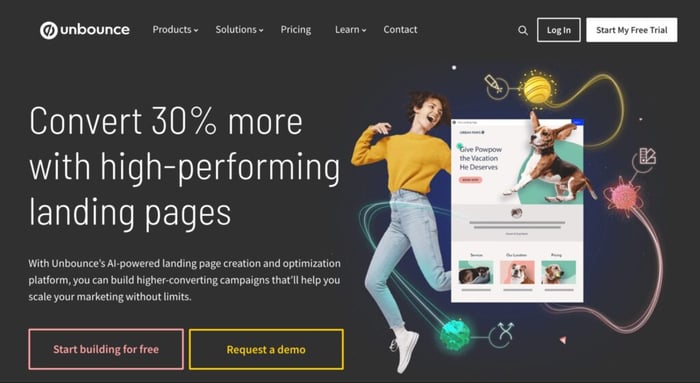
Best Public Relations (PR) Tools
Public Relations software allows PR professionals to collaborate effectively with contacts, as well as plan, manage, distribute, and track campaigns. Some tools may also provide media monitoring functionality, competitive media analysis, and broadcast solutions to help PR professionals make knowledgeable decisions.
Here’s our Top 5:
Brand24
Brand24 is a practical, affordable, and user-friendly PR tool. It helps agencies and brands track and analyze conversations around their clients, brands, products, and competitors.
Brand24 enables its users to monitor their online reputation, prevent a PR crisis, track the results of their campaigns, find brand ambassadors, reach out to relevant influencers, engage communities, improve social customer service, and monitor their competition.
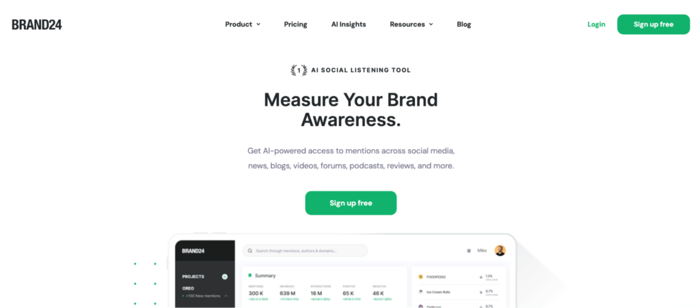
Cision
Cision is one of the best-known and most feature-rich PR platforms around. It recently acquired Brandwatch – a global leader in social listening and digital consumer intelligence – to strengthen its market position.
Cision provides advanced distribution, tracking, and analysis features to ensure you never miss a mention or fail to prove the value of your PR efforts. You can also run content amplification campaigns through the site so that your editorials and content appear in recommended sites.
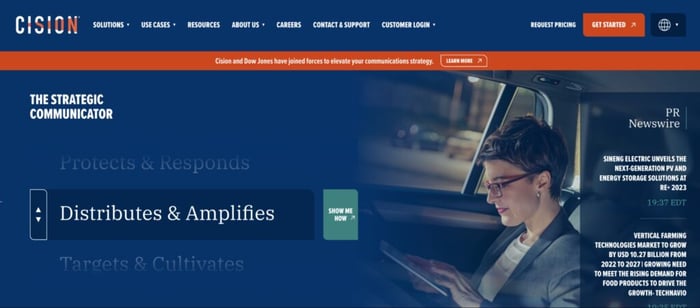
Meltwater
Meltwater’s media intelligence platform gives organizations the information advantage to access billions of online conversations and extract relevant insights to manage their brands strategically. It allows teams to interact on social media, curate content, track competitors and emerging stories, and measure the results of their efforts.
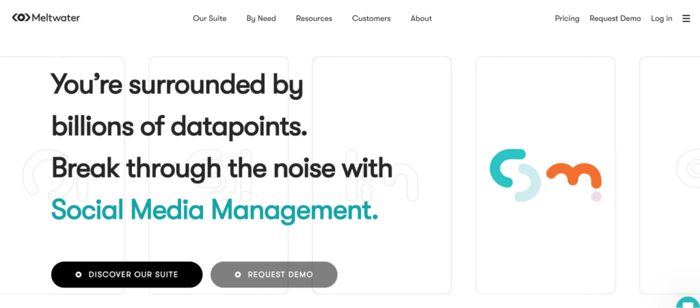
Newswire
Newswire is a top-rated press release and media distribution platform that lets you distribute your news to traditional and digital media outlets, making it easy to launch and track effective press release campaigns.
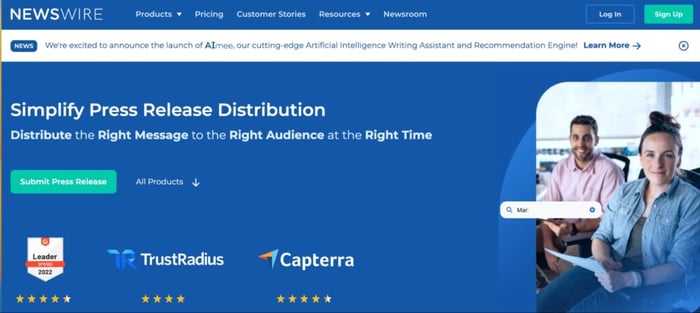
Prowly
Prowly lets PR professionals manage media relations more effectively while saving time on routine tasks. With this user-friendly and modern tool, you can find relevant media contacts easily and organize them into a PR CRM, create visual press releases, send personalized email pitches, and maintain journalist-friendly newsrooms.
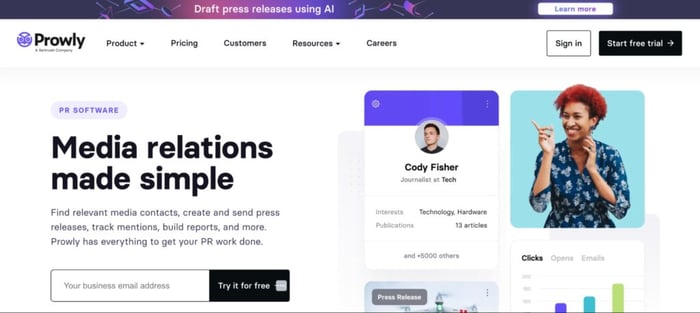
Best SMS Marketing Tools
Companies use SMS marketing software or business text messaging software to coordinate and execute marketing campaigns via SMS (Short-Message Service). Using software like this builds brand loyalty and engagement by sending customers timely, personalized messages.
Here’s our Top 5:
Attentive
Attentive is the most comprehensive personalized text messaging solution boasting 99% open rates, over 30% click-through rates, and more than 25x ROI. Using real-time behavioral data, Attentive automatically sends engaging text messages to each subscriber at every step of the customer lifecycle.
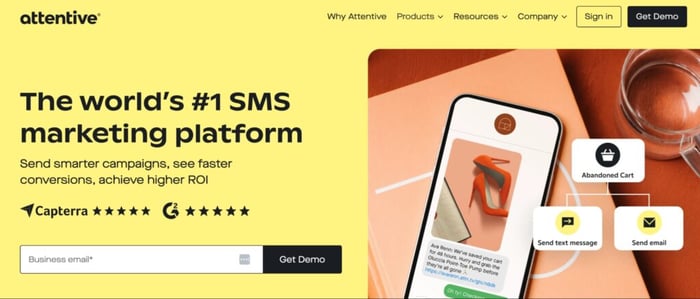
EZ Texting
EZ Texting is a cloud-based messaging platform that allows businesses of all sizes in the U.S. and Canada to reach and engage their mobile audiences. You can use it for sales and promotions, alerts and notifications, lead generation, and customer service.
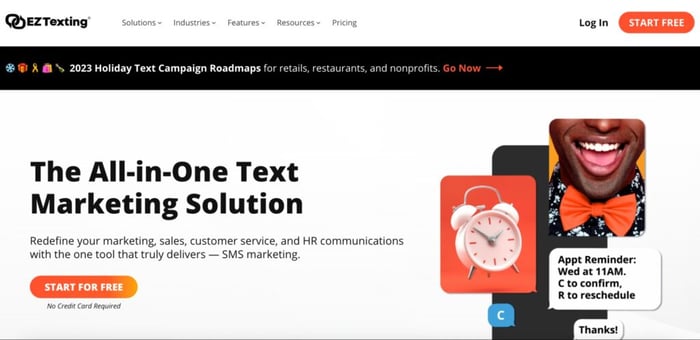
Podium
Podium’s Interaction Management platform uses messaging to make it convenient to interact with your leads, customers, and team at every customer touchpoint. You can message your leads and customers, get reviews and feedback, collect payment, and communicate easily with your team, all in one easy-to-use inbox.
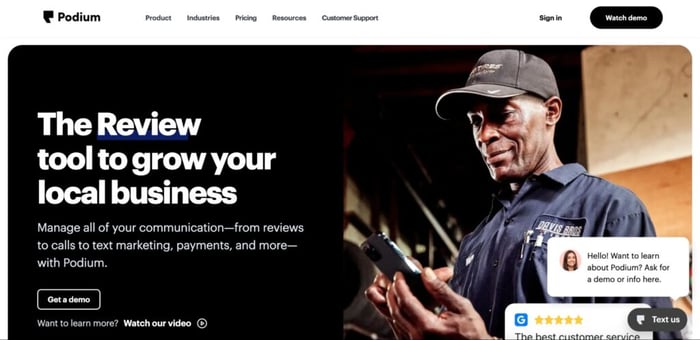
Postscript
Thousands of Shopify stores trust Postscript to manage their SMS Marketing. You can grow a TCPA-compliant subscriber list, use your Shopify data to have two-way conversations with customers, create targeted text marketing campaigns and text marketing automations, such as abandoned cart recovery, shipping notifications, welcome series, and loyalty offers, to give your revenue an immediate bump.
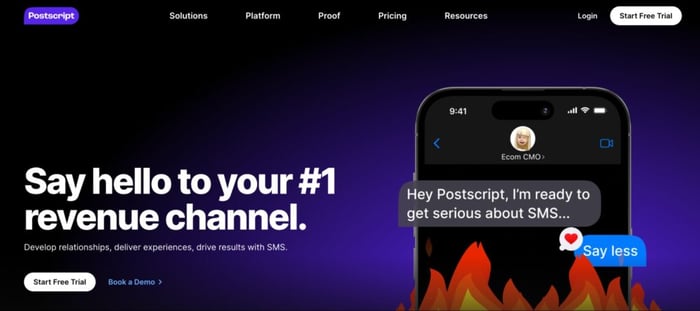
Twilio
Twilio enables software developers to use its web service APIs to programmatically make and receive phone calls, send and receive text messages, and handle other communication tasks.
With Twilio’s API-based SMS services, you can send and receive text messages globally, deliver SMS alerts, notifications, and reminders, and provide customer care through two-way SMS interactions.
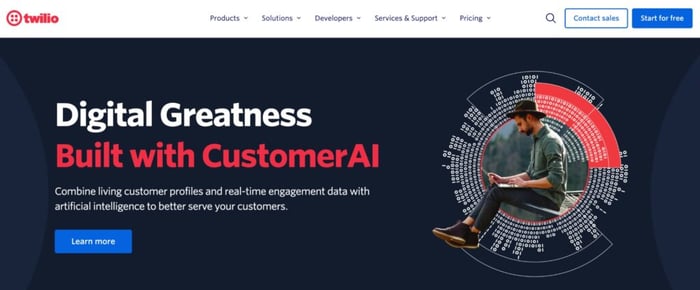
Best Local Marketing Tools
Local marketing software comprises tools for local SEO, local listing management, and online reputation management.
Local SEO software helps businesses get listed in the Local 3-Pack (aka Map Pack) at the top of a Google results page. It may also send accurate listings to search engines, track local search rankings, monitor online reviews, and optimize a company’s Google My Business profile.
Local listing management software provides a central hub for managing and updating location data, such as name, address, phone numbers (NAP), store hours, and menus, on customer-facing platforms.
Online reputation management software helps brands track and engage with local customer reviews on various platforms.
Here’s our Top 5:
BrightLocal
BrightLocal is a local marketing platform that puts you in control of SEO, business listings, and reputation management. Small companies, multi-location businesses, and agencies use it to monitor existing local citations and identify new opportunities, track local search rankings, and manage reviews across multiple websites.
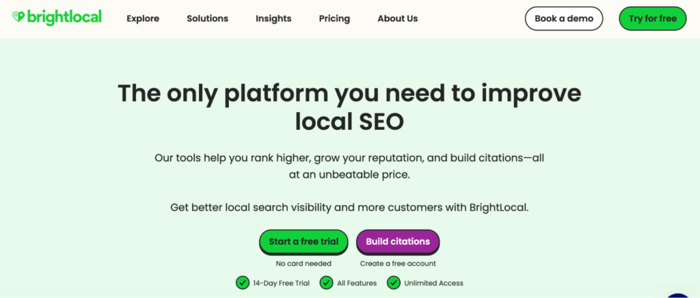
GatherUp
GatherUp provides everything you need to gather, manage, and market your customer feedback, online reviews, and testimonials in one centralized platform. You can save time by creating workflows to automate feedback requests, surveys, and review requests. And you can also share attention-grabbing images of your best feedback and reviews on your preferred social media channels.
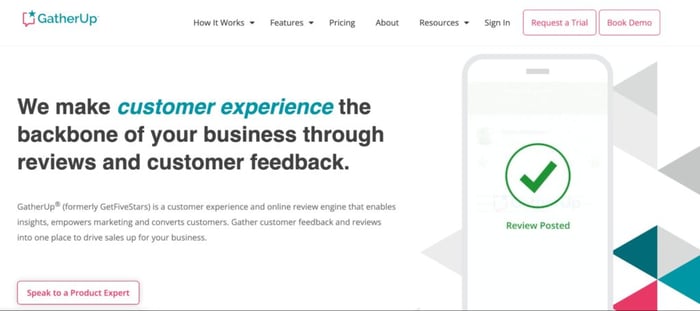
Moz Local
Moz Local helps boost your brand’s local visibility and ensures your listings are correct, consistent, and visible on every directory site. Both small businesses and large enterprises use Moz Local to identify, confirm, and delete duplicate listings and manage reviews on the most popular sites from one central dashboard.
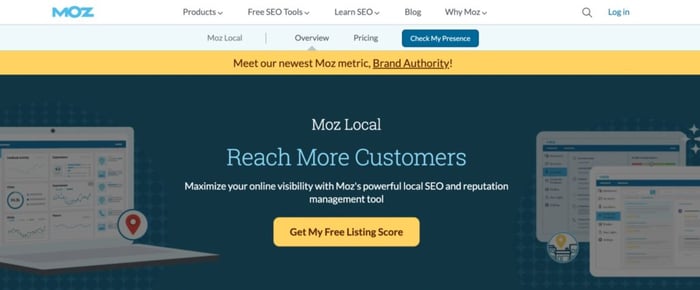
Whitespark
Whitespark’s local SEO toolset helps you build citations, track rankings, and earn reviews to fast-track your success in local search. You can use the Local Citation Finder to track your existing citations, discover new opportunities, and identify the citations your competitors already have (that you’d like, too). And you can use the Reputation Builder to increase your online reviews, customer feedback, and testimonials.
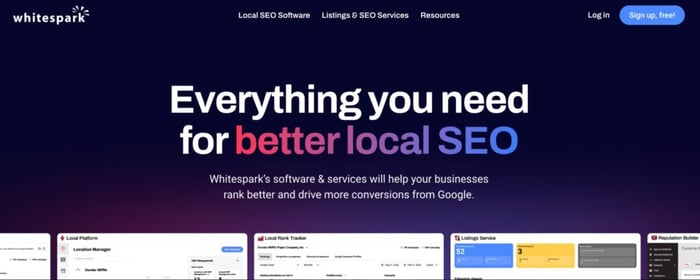
Yext
The Yext Search Experience Cloud platform keeps your online business information accurate and consistent. It helps brands provide correct, up-to-date, official answers to consumer questions across the entire search ecosystem from your website to search engines, voice assistants, maps, apps, chatbots, directories, and social networks.
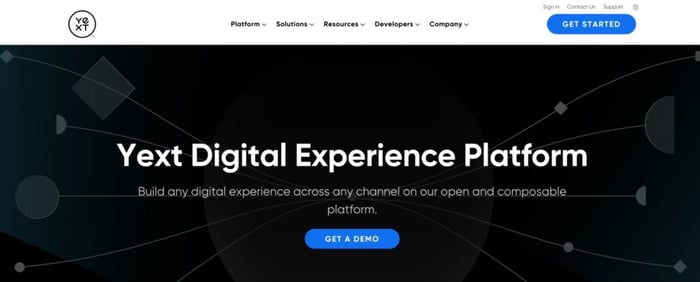

Manage all your social media accounts in one place.
Craft, schedule, & auto-post content to all your social channels, then track analytics and manage interactions from a single, easy-to-use dashboard.
Best Marketing Tools in a Nutshell
Marketing tools come in all shapes and sizes to meet the requirements of different marketing teams. So, make sure you take the time to evaluate the key features of each tool before you decide which is the right platform for your business.
Loomly is the Brand Success Platform that helps your marketing team streamline collaboration. Start your 15-day free trial now.

